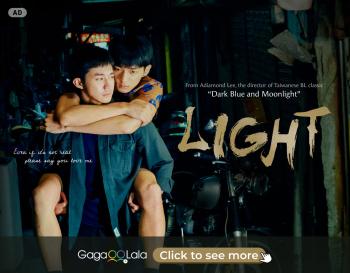After successful screenings in several film festivals across Japan, Hong Kong, Taiwan, and other Asian territories, the Japanese queer deaf film, Until Rainbow Dawn is now available for streaming on GagaOOLala. With rave reviews at the 4th Taiwan International Deaf Film Festival, Until Rainbow Dawn, which is directly inspired by real-life events and experiences of its director Mika Imai, tells the story of the two hearing-impaired protagonists, Hana Takahashi and Ayumi Hoshino, who meet each other through a sign language group, and fall in love, only to face strict opposition and resistance by the society they live in. With scenes that have a bright and clear disposition and a plot that is both, realistic and touching, director Mika Imai, with Rainbow Until Dawn, hopes to eradicate the overall stigma and resistance associated with queer people and especially those of the minority and with disabilities, within and beyond Japan.

Haruka Kobayashi (L) and Eri Nagai (R) in Until Rainbow Dawn (Source: GagaOOLala)
Watch Until Rainbow Dawn on GagaOOLala
What’s wrong with being a lesbian? Can a girl not fall in love with a girl? The hearing impaired protagonist who comes out to her parents is ousted from her family.
Until Rainbow Dawn casts actresses Eri Nagai and Haruka Kobayashi together on screen for the first time where they take the lead roles of Hana Takahashi and Ayumi Hoshino as the main protagonists in the film. Hana and Ayumi, both deaf, meet through a sign language group and they eventually start liking each other. With her new-found feelings for Ayumi, Hana bolsters up the courage to go back to her parents and comes clean about wanting to date a girl. To this, her parents swiftly reject her and ask her to leave. Left shocked, lost, and feeling rejected by her own family, Hana, then, rushes to Ayumi and cries her heart out, telling her, “I've broken up with my boyfriend. If you were a boy, I would totally date you.” to which Ayumi firmly replies, “Why? Can't a girl date a girl?” Upon hearing Ayumi’s response, Hana ultimately decides to pursue what’s really matters to her, her love and her happiness.
Actress Haruka Kobayashi genuinely expressed her hope that the film could find its way into the curriculums of schools and colleges and bring about a positive change in the education system. She stated. “Many people might already find it difficult to relate with the predicaments that deaf queer people face. I hope such people can realize that when you put the struggles of being queer and a hearing disability in one body, it’s way harder than one can ever imagine.”

The deaf lesbian protagonist, Hana Takahashi comes out to her parents. (Source: GagaOOLala)
Invited to join a “threesome” on a trip with her girlfriend. The lesbian director adapts her real-life story and experience into the film.
Until Rainbow Dawn borrows from the personal experiences of the bisexual hearing impaired director Mika Imai. As a queer differently-abled minority herself, Mika came out to her parents at the age of 19 to which her parents reacted way more positively than that of protagonist Hana’s parents’ in the film. Upon confessing to her parents that she has been dating girls in the past, Mika's father calmly pointed towards LGBT-related DVDs in her room and told her that he had already figured it out. Nevertheless, Mika's father still expressed his hope for her to eventually be able to find a man to get married to and start a family with.
It was not until years later when Mika was modeling for an LGBT-related photography exhibition, that her father came to visit her. There, he proudly took a selfie of himself in front of Mika’s picture and sent it to her. And it was at that point in time that Mika became certain that her father had finally accepted her for who she is. In an interview, Mika mentioned “Now, every time we meet, my father only has one main question. When exactly are you going to find yourself a girlfriend?”

What's wrong with being a lesbian? Until Rainbow Dawn shows us its point of view. (Source: GagaOOLala)
Growing up in a hearing-impaired school and seeing queer people being constantly oppressed in its conservative environment, Mika buried her secret identity deep in her heart. To this, Mika commented “The atmosphere itself was as such that homosexuals made the easiest targets, especially among the people with disabilities like us. So all you could do to stay safe was to keep it to yourself. Given the deaf community at the time was very small and the words would spread like wildfire, chances were that everyone would come to know of your secret identity sooner or later.” This remark, thus, clearly points to the immense pressure that deaf people face when it comes to their sexual orientation and gender identity as opposed to queer people without disabilities.
Elsewhere, director Mika Imai also went on to share one of her other personal stories in an interview. There, she talked about a trip she took several years ago, where in order to minimize the travel expenses of the trip, she and her friends rented a room for eight people altogether. And as she was laying in bed and chatting with her girlfriend, a male friend came up to them and asked them about how lesbians kiss and make love. Later, he went further by questioning them if they would be up for a threesome with him after a few drinks. The incident offended Mika and she felt harassed, just like the sexual abuse scene in the 2020 Taiwanese social-psychological thriller drama film, The Silent Forest.
Sexual diversity is a fact of life and equally impacts the deaf queer community as they hope for the same gender and marriage equality. So, where exactly is real sex equality?
While Until Rainbow Dawn chiefly revolves around the two lead lesbian protagonists, Hana Takahashi and Ayumi Hoshino, the movie does not necessarily limit itself just to the challenges and issues faced by the hearing impaired lesbians. In fact, the film goes a long way to feature and bring to light several different characters and storylines of gay, transgender, and other sexual minorities with similar disabilities.

Not only lesbians but also gay and transgender characters and storylines are featured in Until Rainbow Dawn. (Source: GagaOOLala)
Sora Tamada, who plays Sho in the film, is the pitcher of School for Hearing Impaired’s baseball team in real life. In the film, Sho confesses his sexuality to a senior and he soon becomes the hot topic of gossip for the entire school. Filled with anxiety about his secret made public, he drops out of school and cuts off all the connections with the outer world. Concerned, his teacher, visits Sho and asks him, “Are you alright? Everyone is worried about you. I can understand what it’s like to fall in love with someone. Maybe the world can’t understand you yet, but I’m sure you will find someone that is right for you.” Overwhelmed by the teacher's words and concern, Sho then responds, “If there is some sort of a magic pill for deaf people that can help them regain their hearing, I think I will take it. Because I want to hear what the other side is thinking and how are they viewing us.”

Sora Tamada (L), who played Sho in the film is also a catcher for a baseball team in real life. (Source: GagaOOLala)
Until Rainbow Dawn is now available for streaming on GagagOOLala. But besides the disabled focused queer title, the LGBTQ+ streaming platform from Taiwan has also released a slew of several different queer Japanese films, series, and animes to commemorate the island nation's friendship with Japan, which include the BDSM movie, Dangerous Drugs of Sex, BL fan favorites, Love Stage!! and Given!, the BL mini-series The Shortest Distance is Round featuring the real-life Japanese adult entertainer, Riku Mukai, and many others titles such as Merry Christmas, Mr. Lawrence, Ossan’s Love: LOVE or DEAD, His, and more.




















